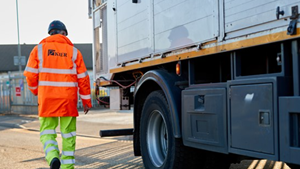News
Kier explores H2 fueled net zero depots in its highways business
Kier is working with Protium, a green H2 energy services company, to conduct a feasibility study examining if its highway depots can be powered using green H2.
The study will explore how H2 and fuel cell technologies can complement other renewable energy sources, to fuel existing fleet depots and equipment in the highways business. It will look at the environmental, technical and financial benefits of using H2 and fuel cell technologies, and how this can help Kier Highways achieve its target of being net-zero on its scope 1&2 (operational emissions) by 2030.
The feasibility study is due to be completed in summer 2023 and will aim to create a blueprint for future net-zero depots. This includes everything from the heating and lighting, and a focus on heavy goods vehicles (HGVs), such as gritters.
Key to Kier Highways achieving its net-zero targets is via its fleet, which contributes to most of its scope 1&2 emissions. Kier Highways has an ambition to electrify small fleet, whilst focusing on H2 for HGVs.
“We will need a mix of renewable green fuels to achieve net zero and deliver our services in the future. Whilst we are focusing heavily on other renewables and electric vehicles for smaller fleet, working with Protium will help us to understand how hydrogen will play a role in the future of highways construction and maintenance,” said Matt Tompsett, head of environment and sustainability at Kier Highways.
“We’re excited to progress our hydrogen journey with one of the UK’s leading green hydrogen energy company and I look forward to seeing the results of the study and then understanding how we can progress our hydrogen use in the Highways business.”
Also commenting on the announcement, Chris Jackson, CEO and founder of Protium said, “We are delighted to be working with Kier Highways to support its ambitions towards a net -zero future. As a company that today keeps over 21,000 km of strategic road network and local roads flowing for the 279.6-B vehicle miles, Kier Highways is front and center among UK businesses that are trying to address the challenge of delivering a net zero future for the UK transportation sector. Developing solutions in partnerships allows both parties to support their shared goals of a lower carbon future for the UK.”
Preparation for the feasibility study is already underway with an assessment of fleet make up and mileage.


